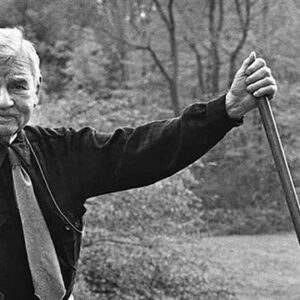Malcolm Cowley was an American literary critic, poet, editor, and social historian who became a member of America’s ‘Lost Generation’ following World War I. He was born to a homeopathic physician and was a dedicated student from an early age, winning a scholarship to attend a prominent university to further his education. During World War I, he served in the American Army in France, interrupting his studies. Following his graduation, he spent his time in France making connections with some of the world’s most recognized literary authors, and upon his return to America, he began working as a freelance writer and translator. He went on to work as an editor before becoming a poet and novelist. His writings were well-received by readers, and he was considered an exceptional author of his day. Readers were intrigued by his distinctive writing style and imaginative thinking, and they admired his honesty. He was regarded as one of the generation’s most influential figures, and his colleagues admired him for his sincere efforts to improve society. Through his outstanding writing ability, he transformed American literature.
Childhood and Adolescence
William Cowley, a homeopathic doctor, and his wife, Josephine Hutmatcher, had him on August 24, 1898, in Belsano, Cambria County, Pennsylvania.
Because his father worked at a clinic in Pittsburgh, he grew up in the East Liberty area. He adored Belsano, where he and his family used to spend their summer vacations.
He acquired his early schooling at Peabody High School in Pittsburgh, Pennsylvania, where he met Kenneth Burke, a literary theorist who eventually became his buddy. He afterward described his time at school as the best of his life. In 1915, he graduated from secondary school.
In 1915, he was awarded a scholarship to Harvard University, where he began his graduate studies. His studies were interrupted by World War I in 1917, and he served in France as an American Ambulance truck driver. He also contributed to the Pittsburgh Post-Gazette with pieces about World War I.
He returned to America in 1918 to finish his studies. In 1920, he earned his bachelor’s degree in arts, cum laude. He then relocated to Montpellier, France, to continue his studies at the University of Montpellier.
Malcolm Cowley’s Career
He made acquaintances with writers from the “Lost Generation,” including Ernest Hemmingway, F. Scott Fitzgerald, Ezra Pounds, Edmund Wilson, and others, while in France. In addition to his education, he worked for avant-garde literary periodicals including ‘Broom’ and ‘Secession.’
In 1923, he came to America and was engaged as an advertising copywriter and translator by Sweet’s Architectural Catalogue in New York City in 1925. He stayed with the company until 1929, translating seven novels from French to English.
He was appointed literary editor of ‘The New Republic’ in 1929, a position he held for the next 11 years. In 1929, he also released his first collection of poetry, ‘Blue Juniata,’ and established himself as a poet.
‘Exile’s Return: A Narrative of Ideas,’ his autobiographical non-fiction book, was released in 1934. It highlighted the experiences of American expatriate authors in the 1920s, as well as the significance of America’s rediscovery as a literary source.
He co-founded the League of American Writers in 1935 with a group of other writers and served as its vice president. He was involved in the push to persuade the United States government to back the Republicans in the Spanish Civil War. In 1940, he resigned from his position.
‘The Dry Seasons,’ his second book of poems, was published in 1941. He became the editor and literary adviser of the Viking Press in the 1940s, a position he kept until 1985. He edited some of the most famous authors, including Ernest Hemmingway, William Faulkner, and Nathaniel Hawthorne.
In 1954, he wrote ‘The Literary Situation,’ a portrait of American writers in society. Cowley taught the Stegner Fellowship graduate program at Stanford University in the fall of 1960.
‘Think Back On Us’ (1967), ‘A Many-Windowed House’ (1970), ‘And I Worked at the Writer’s Trade’ (1978), ‘The Dream of the Golden Mountains: Remembering the 1930s’ (1980), and ‘The View from Eighty’ are among his other non-fiction works (1980).
‘The Portable Faulkner’ (1946), ‘The Portable Hawthorne’ (1948), and ‘The Complete Poetry and Prose of Walt Whitman’ were among his edited works (1948).
His Major Projects
In 1946, he edited William Faulkner’s collection of short stories, ‘The Portable Faulkner,’ which became one of his most well-known works. It cemented Faulkner’s reputation as one of the greatest authors of all time, and Faulkner thanked Cowley for his substantial contribution as the book’s editor.
And I Worked at the Writer’s Trade, published in 1978, is mostly autobiographical with parts of literary history.
Achievements & Awards
For his poetry, he was awarded the ‘Harriet Monroe Memorial Prize’ in 1939.
For his outstanding work, ‘And I Worked at the Writer’s Trade,’ he received the ‘National Book Award for Biography’ in 1980.
In 1981, he was also awarded the ‘National Institute of Arts and Letters Gold Medal.’
Personal History and Legacy
During his graduation years at Harvard University, he married “Peggy” Marguerite Frances Baird, a landscape painter, in August 1919. Following his graduation, they traveled to France before returning to the United States in 1923. In 1931, they divorced.
He married Muriel Maurer in June 1932, and they had a son named Robert William Cowley. Later in life, their son worked as an editor and a military historian.
He died of a heart attack on March 27, 1989, in New Milford, Connecticut, United States of America.
Estimated Net worth
Malcolm is one of the wealthiest poets and one of the most well-known. Malcolm Cowley’s net worth is estimated to be $2 million, according to Wikipedia, Forbes, and Business Insider.


